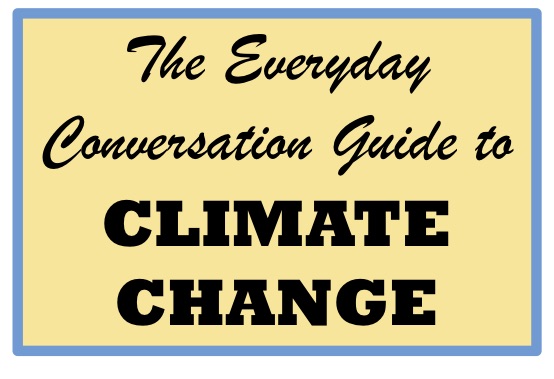This is a brochure that Emily Upton and I wrote on logical fallacies and the use of rhetorical techniques in conversations on climate change and climate change denial.
The George C. Marshall Institute was a conservative think tank that provided resources for people to use to create doubt about the science of climate change. One of those resources was The Cocktail Conversation Guide to Global Warming. It was a brochure that you could carry to a party. We found that fact interesting and decided to make a brochure. It’s old school, you can print it out and tri-fold it.
The Everyday Conversation Guide to CLIMATE CHANGE is a short description of rhetoric or argumentation. It examines how people debate points and, specifically, it looks at logical fallacies. In debate, advocacy, and political arguments, people often rely on logical fallacies to convince people of a point – or to raise enough doubt that they are uncertain.
Over the years of teaching students about climate change, I have found that introducing these concepts from rhetoric is very powerful. It changes the nature of conversations. If the conversation is with a person truly interested in knowledge and evidence, then recognizing the flaws in logic is, often, convincing. If someone is only interested in making a political argument or raising doubt, then they might not care about the strength of their argument. However, if there is an audience, then you might be able to make convincing points with that audience.
Emily and I are not scholars of logic and rhetoric. Within the field of climate change, there are those who are focused on, specifically, logic and communication. Two experts I look to often are John Cook of George Mason University and Matthew Nisbet of Northeastern University.
Misinformation and Disinformation: Misinformation and disinformation are false information. Disinformation is usually viewed as having intent to deceive, misinformation, perhaps, being used in ignorance, without intent to deceive. They are both part of “fake news” and the culture of social networks. This site also includes materials to detect misinformation and disinformation – and perhaps the institutional use of propaganda.
Just a point: The ideas introduced here are not just a tool of climate deniers or political arguments. Advocates often rely on managing information to their advantage. Advocacy is an important part of our culture and developing policy. It is important to know when you are functioning as an advocate, or conversing with an advocate.
… and remember, this is not something new – “… in the case of some people, not even if we had the most accurate scientific knowledge, would it be easy to persuade them …” (Aristotle, Rhetoric, 350 BC)
Some quick links:
- Link to Rood lecture and Resources on Communications: Logical Flaws, Rhetoric, Forms of Argument
- link to The Everyday Conversation Guide to CLIMATE CHANGE (To print .pdf as a brochure, chose “actual size,” “two-sided,” “landscape,” “flip on short edge.”)
- International Federation of Library Associations: Fake News Graphic
- Wabisabi Learning: Critical Thinking Cheat Sheet
From John Cook and colleagues:
- Conspiracy Theory Handbook: Excellent quick guide to identifying and managing conspiratorial thinking.
- The Science of Crank Uncle Playlist
- Part 1: Why We Can’t Ignore Misinformation
- Part 2: Inoculation Theory
- Part 3: Fighting Misinformation with Critical Thinking
